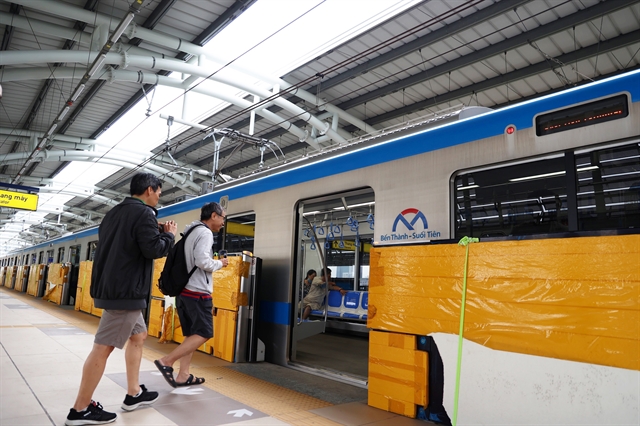 Society
Society

 |
| People go on the Bến Thành-Suối Tiên metro in Bình Thạnh District, HCM City. — VNA/VNS Photo Hồng Đạt |
HÀ NỘI — In the increasingly developing urban railway system in Hà Nội and HCM City, domestic construction companies have great opportunities but also challenges if they want to transform, dominate the market and affirm their position.
Currently, most of the important packages in urban railway construction projects in Việt Nam are undertaken by foreign contractors.
Humble presence
Deputy Director of the Hà Nội Urban Railway Management Board Lưu Trung Dũng said that in recent years, a number of domestic enterprises had gradually made their mark while working in large urban railway projects, participating in areas such as foundation reinforcement and installing electromechanical systems.
For example, in the Bến Thành-Suối Tiên metro line and the Nhổn-Hà Nội Station projects, a domestic firm was responsible for reinforcing the foundations, building diaphragm walls, treating weak soil with advanced technology and acted as a subcontractor.
Two other domestic enterprises also supplied precast concrete components and undertook the construction of electromechanical systems, including installing power supplies and providing ventilation and air conditioning systems for stations along the Nhổn-Hà Nội Station Urban Railway.
Experts believe that domestic contractors have significant advantages over foreign contractors because they have deep understanding of geological and environmental conditions and the need for urban infrastructure construction in Việt Nam.
However, despite their presence, reality shows that the proportion of work undertaken by domestic contractors remains modest.
At present, most of important packages in urban railway projects are still carried out by foreign firms.
This is due, not only from the strict technical requirements of urban railway construction projects, but also from the lack of practical experience, limitations in technology, finance and specialised human resources.
Việt Nam is aiming to build a modern urban railway system in major cities to tackle congestion and move towards sustainable development.
These projects are not only an opportunity to modernise urban infrastructure, but also an important stepping stone for domestic enterprises to participate more deeply in the construction and operation of urban railways.
And to make the most of this opportunity, there must be a specific mechanism and a synchronous strategy for domestic construction enterprises to transform.
Creating momentum
Transport expert Vũ Hoàng Chung said that one of the six groups of specific policies for urban railway development in Hà Nội and HCM City that the Government had submitted to the National Assembly was railway industry development, technology transfer and training.
The policies stipulate specific contents on selecting and applying standards and norms for urban railway lines, developing science, technology, and training to develop human resources.
Therefore, it is necessary to create conditions and give priority to domestic contractors to receive technology transfer and join urban railway projects.
At the same time, domestic enterprises need to make every effort to meet the extremely high technical requirements and standards of important billion-dollar projects such as urban railways.
Chung said that in order for Vietnamese enterprises to gradually dominate the market and affirm their position, improving internal capacity and building appropriate support mechanisms from the Government were key factors.
In particular, it is necessary to develop a high-quality workforce through in-depth training of engineers and skilled workers in the field of urban railways, combined with the construction of specialised research and testing centres.
Chung suggested that the Government promote technology transfer and strengthen cooperation between domestic enterprises and international partners to acquire advanced technology, especially underground construction, electromechanics and operations.
In addition he wished to see improvements in bidding mechanisms and support policies to ensure transparency and fairness, and to create conditions for Vietnamese contractors to participate more in high-tech projects.
Chung proposed to increase localisation of materials and equipment, encourage the use of domestically produced products to reduce costs and increase initiative in project implementation.
In addition, he believes that specific mechanisms and policies were needed to create momentum, helping domestic enterprises improve competitiveness and gradually tackle important bids.
This not only opens up opportunities to access advanced technology but also helps Vietnamese enterprises accumulate experience, expand scale and affirm their importance in the urban infrastructure construction market.
In the future, Chung said, improving technological, financial and project management capacity would help Vietnamese enterprises confidently undertake large-scale projects, reduce dependence on foreign contractors and create sustainable development momentum for the construction industry in Việt Nam. — VNS




